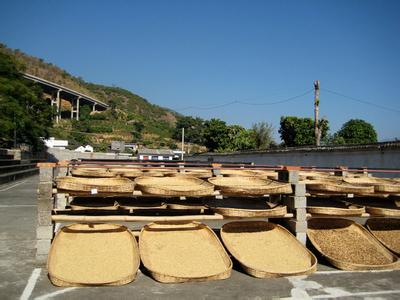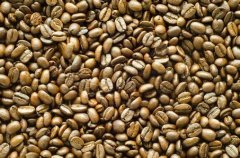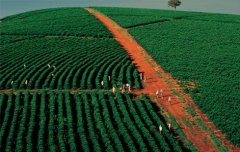A brief introduction to the treatment methods of grinding degree and baking degree of a wide variety of Brazilian boutique coffee beans

Brazil is vividly compared to the "giant" and "monarch" of the coffee world. There are about 3.97 billion coffee trees there, and small farmers now grow 75% of Brazil's total coffee production. Brazil produces twice or even three times as many coffee as Colombia, which is the second largest coffee producer in the world.
There are many large farms in Brazil, which run endless coffee plantations. They use machines to harvest and dry them. They are so efficient in automation that they regard coffee as a general agricultural material and completely abandon the flavor and flavor. As a result, many select coffee companies simply do not sell Brazilian beans so as not to demean themselves. In select coffee shops, there are still occasional Brazilian "santos" coffee, but they are all "Bourbon Santos" (bourban santos) rather than low-priced "Ping Dou Santos". Santos is a descendant of the Bourbon species, hence the name Santos Port exit.
The annual precipitation of Bawu Manor is 1800mm, which is located on the plateau with an elevation of 1100m. The farm, with a scale of about 700 hectares, is a farm that only produces boutique coffee with the latest equipment and thorough quality management. Most of the coffee in Bawu Manor is supplied to customers who give priority to quality, namely, Tullys, Key coffee, etc., due to the characteristics of its boutique coffee, the quantity is very limited, so only a small amount of the cultivated area in circulation on the market is located at an altitude of about 1100 meters, with an annual precipitation of 1800mm to 2000mm. This environment is an ideal condition for coffee cultivation in Brazil. Yellow bourbon is based on mucosal drying and semi-washing treatment (Pulped Natural Method). Although this method removes the pulp directly after the coffee bean is harvested, it retains the mucus that wraps the endocarp of raw beans to dry. As a result, coffee retains a dry aftertaste (clean aftertastes), mild texture and sweet sour bourbon is a branch of Arabica beans, and the word "bourbon" comes from place names.
Brazilian coffee generally refers to coffee produced in Brazil. There are many kinds of Brazilian coffee, and like other Arabica coffee, Brazilian coffee is called "Brazils" to distinguish it from "Milds" coffee. The vast majority of Brazilian coffee is unwashed and sun-dried and is classified according to the name of the state of origin and port of transport. Brazil has 21 states and 17 states produce coffee, but four of them produce the largest, accounting for 98% of the country's total output. They are: Parana, Sao Paulo, Minas Gerais and Espirito Santo. The southern state of Parana is the most amazing, accounting for 50% of the total.
Brazil is vividly compared to the "giant" and "monarch" of the coffee world. There are about 3.97 billion coffee trees there, and small farmers now grow 75% of Brazil's total coffee production. Brazil produces twice or even three times as many coffee as Colombia, which is the second largest coffee producer in the world.
Flavor features: balanced sweet, creamy smooth, orange, apricot and other fruit flavor, chocolate, caramel flavor
Manor: Saint Ario Manor Red Bourbon
Country of origin: Colombia, Colombia
Production area: Koka Cauca
Variety: Red Bourbon
Altitude: 1950-2050 Meters
Although coffee is diverse, Brazilian coffee is suitable for the taste of the public. For example, coffee produced in the northern coastal areas has a typical iodine taste, reminiscent of the sea after drinking. This coffee is exported to North America, the Middle East and Eastern Europe. Another kind of coffee that is interesting and worth looking for is washed Bahia coffee. This kind of coffee is not easy to find because Brazil is the largest consumer of coffee in the world after the United States, and many good coffee can only be found in its domestic market.
Brazil Syrador Yellow Bourbon (Brazil Cerrado Yellow Bourbon): the three major boutique coffee producing areas in Brazil are Syrador, South Minas and Mojiana in the central and western part of Minas province. Brazil's Yellow Bourbon is located in the Hirado region of Brazil. However, not all coffee produced in the prairie of Syracuse can bear the name of Syrador, which is limited to the plateau of 1100 to 1300 meters above sea level in the central and western part of Minas province, with high elevation and fertile soil.
Yunnan Yimutian Fine Coffee Farm-Yunnan Fine Coffee Bean Manor, China
One day R boutique coffee manor is put forward by senior coffee practitioner Wen Coffee, and together with high-quality and multi-land producing areas, experienced farmers work together to establish a boutique coffee experimental base, after a long period of training, trial planting and breeding, select high-quality coffee and adjust measures to local conditions; finally get the unique regional flavor garden boutique coffee beans
Important Notice :
前街咖啡 FrontStreet Coffee has moved to new addredd:
FrontStreet Coffee Address: 315,Donghua East Road,GuangZhou
Tel:020 38364473
- Prev

A brief introduction to the planting situation of Brazilian boutique coffee beans, geographical location, climate and altitude
Product name: Brazil Yellow bourbon Brazil Chacal Estate Yellow Bourbon gauge: 227g raw bean production country: Brazil production area: Minas Minas Llicinea Manor: waterfall Manor species: yellow bourbon Grade: 2 d/300gr, 17-18 mesh height: 1200m ~ 1380m treatment: sun baking degree: medium and deep baking taste characteristics: sweet and smooth
- Next

A brief introduction to the flavor and aroma characteristics of Kenyan boutique coffee beans with fruit flavor
Kenyan coffee has a wonderful fruit flavor, tastes like BlackBerry and grapefruit, and is a favorite of many coffee gluttons. This coffee has an excellent medium purity, crisp and refreshing taste. It has a fresh flavor and is most suitable for drinking iced coffee in summer. When tasting this coffee, if it is paired with fruit with acidity such as grapefruit, it will certainly give me the best coffee.
Related
- Detailed explanation of Jadeite planting Land in Panamanian Jadeite Manor introduction to the grading system of Jadeite competitive bidding, Red bid, Green bid and Rose Summer
- Story of Coffee planting in Brenka region of Costa Rica Stonehenge Manor anaerobic heavy honey treatment of flavor mouth
- What's on the barrel of Blue Mountain Coffee beans?
- Can American coffee also pull flowers? How to use hot American style to pull out a good-looking pattern?
- Can you make a cold extract with coffee beans? What is the right proportion for cold-extracted coffee formula?
- Indonesian PWN Gold Mandrine Coffee Origin Features Flavor How to Chong? Mandolin coffee is American.
- A brief introduction to the flavor characteristics of Brazilian yellow bourbon coffee beans
- What is the effect of different water quality on the flavor of cold-extracted coffee? What kind of water is best for brewing coffee?
- Why do you think of Rose Summer whenever you mention Panamanian coffee?
- Introduction to the characteristics of authentic blue mountain coffee bean producing areas? What is the CIB Coffee Authority in Jamaica?

